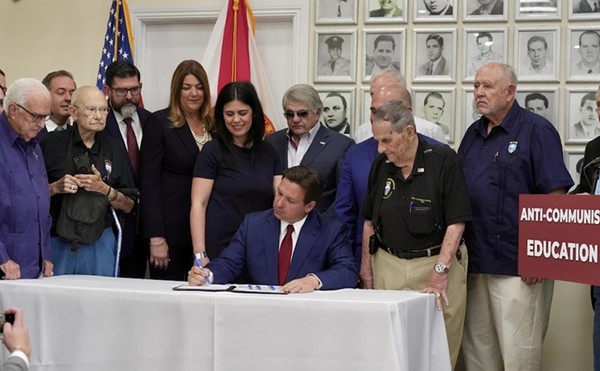The man – I’ll call him Hector – was looking for work when he boarded a flight from Guatemala to the United States in March 2012. He’d been here as a temporary worker several times in the past, and this trip was supposed to be no different – a few months of hard work for more money than he could ever hope to make at home. He planned to return in June, right around the time his wife would give birth to their first child.
But Hector hasn’t been home since. He hasn’t seen his wife in more than two years. He never saw his baby. It’s possible that he will never be able to go home again. What was supposed to be a three-month stay in the United States turned into an open-ended hell.
One day in April, when the skies were open and pouring, I met Hector in a small conference room at Florida Coastal School of Law’s Immigration Clinic, where I worked as a clinician in 2008. The clinic represented Hector in his visa application; in January, he had received a T-visa, which allows immigrant victims of human trafficking to become lawful permanent residents of the United States.
I wasn’t surprised by Hector’s vague unease and fleeting eye contact when he politely shook my hand. It’s hard not to imagine what the slim, strong 27-year-old, dressed neatly in a T-shirt and slacks, might think or feel about opening up to a white female stranger.
I offered him the guava empanadas I’d brought. James Carbonell, one of the clinicians who worked on his case, translated for us, kindly helping me with the Spanish pronunciation of “guava.” Guayaba didn’t roll quite right off my American tongue, but it made Hector smile. Slightly more at ease, he began.
The story he told is, in a sense, quintessentially American, that of hard work and sacrifice and aspiration. But it’s also a story that highlights the dark side of American capitalism – an exploitative avarice that preys upon those with few good options.
When we think of human trafficking, our minds often go to sex workers – and for good reason. Many human trafficking cases – as many as 27 million people are trafficked worldwide each year, according to the U.S. State Department – are related to sex, and the image of a poor teenage girl forced to prostitute herself tugs at the heartstrings in a way few other things do.
But there is another, less-visible face of a human trafficking victim: Hector’s. He is a labor trafficking victim, one of too many people who have fallen through the cracks of our nation’s guest worker system.
Most labor trafficking victims in this country are Hispanic immigrants. Some are brought here legally; others already live here illegally and are exploited by those who use their undocumented status against them. Too often, advocates say, these individuals aren’t seen as victims, and their plights are ignored.
As Tomas Lares, chairman of Greater Orlando Human Trafficking Task Force and executive director of Florida Abolitionist, puts it: “Somebody forced into sex: Wow, that’s awful. Somebody forced into labor: It’s probably their fault. They’re probably illegal.”
Hector’s ordeal began rather inconspicuously: A man approached his brother during a soccer game in Guatemala, saying he was a contractor for an American company that needed agricultural workers. Hector, his brother and several other men later met with him to discuss the opportunity.
The man’s promises were different from the ones Hector had heard on previous trips as a guest worker. The pay was supposed to be higher, the treatment better. The recruiter also said their visas would be extended for as long as nine months, far longer than on previous trips.
“The contractor told me that the work would be continuous and if that, at any time, I wanted to come back home, they would pay for not only the airline ticket to come to the United States but also the return flight,” Hector says.
None of that happened.
The men had to pay a $150 application fee to be considered, Hector says. They didn’t know that it’s a violation of federal law for companies to require a fee for a guest worker visa application.
After his application was accepted, Hector borrowed money from a loan shark and gave $2,000 to the company to buy his plane ticket from Guatemala to Atlanta. (A search on June 12 for flights from Guatemala to Atlanta in July found round-trip tickets ranging from $529 on CheapoAir.com to $539 on Expedia.com.) He was to be reimbursed $500 when work began. (He says he wasn’t.) Under federal law, companies can require workers to pay for initial travel costs, but must reimburse them in full upon completion of half the agricultural season.
The Central Georgia blueberry farm that Hector, his brother and between 75 and 85 other men would call home for the next three months is miles from a paved road, far outside of town. The recruiter traveled with them and remained with them throughout their stay. (Hector asked me not to identify the recruiter, whom he believes may still pose a threat to his family in Guatemala. Because I shielded Hector’s identity when I called the companies he worked for to ask about his allegations – he fears that the companies will share that information with the recruiter – I will not identify those businesses here, either.)
The day after they arrived at the ranch, Hector says, the men were summoned to the office, where a secretary asked for their documents to fill out paperwork.
“They didn’t explain to us what documents we were going to fill out,” Hector says, “but I think it was to pay for taxes and things like that. When we finished filling out the applications, the secretary kept all of our documents and didn’t return them. We didn’t have a problem with it at first.”
Hector had heard stories from others who came to the U.S. as guest workers, stories of people crammed into deplorable living conditions and being paid much less than they were promised, while working far more. But other than the close quarters – they slept in bunk beds, 18 men to a room – and foul-smelling tap water, at first everything seemed acceptable. Perhaps not ideal, but acceptable.
They went to work for a nearby pine-straw company – 12 hours a day, seven days a week. Hector threw himself into it, packing as many as 150 to 200 bundles of pine straw a day, making 90 cents per bundle. The relationship between the berry farm and the pine-straw company isn’t clear, says Jim Knoepp, deputy legal director of the Southern Poverty Law Center, which assisted the two companies’ guest workers. “It seems that they work pretty closely together,” Knoepp says. “The workers seem to be shared between the companies. Workers live in [the farm’s] housing but they work for [the pine-straw company].”
Like many other aspects of Hector’s experience, that is illegal. H-2A visas for guest workers are specific to the company that files them; the men should have been able to work for either the pine-straw company or the farm, not both.
In the first few days, they realized that the water didn’t just smell bad; many men became ill after drinking it. Hector asked the managers, including the recruiter, to provide potable water. They refused, and told him that if he wanted water, he’d have to buy it.
Procuring supplies became another issue. Once every eight days, the men were loaded on a bus and taken to Walmart, where they had approximately 30 minutes to buy food, water and other supplies and send money home. If anyone wanted to go to town, he’d have to buy gas for the bus. And forget about going out after work; at night, they were left on the farm’s ranch behind a locked gate.
At least they were being paid – envelopes of U.S. dollars on Friday afternoons. But the numbers never seemed to add up, Hector says. For packing 150 bundles of pine straw a day for seven days at 90 cents per bundle, Hector should have earned $945. He usually got less than half that. He averaged between $300 and $400. He learned through word of mouth that the rest was supposedly going to taxes, rent ($30 a week) and other costs.
“They would deduct from the money we got paid for the rides to be able to get to work, the rent, they would deduct the tools that I was using to be able to do the packing, the taxes,” Hector says. “We would pay for everything and then whatever was left was what we would get.”
The money that was left over didn’t go nearly far enough. In addition to having to buy his own drinking water, he estimates, he was spending $60 a week on packing ties for the pine straw.
Hector was accustomed to hard work and little pay – in Guatemala, he made around $50 a week for agricultural work – but this was different.
Federal law requires H-2A employers to provide housing, transportation and sustenance, in addition to tools, equipment and other supplies necessary for workers to complete their assigned duties. By law, Hector should also have been given a written accounting of any costs deducted from his pay. He says he wasn’t.
After two months, blueberry farm personnel said they were going to apply for a three-month extension of the guest workers’ visas. Hector agreed. The pay may not have been great, but it was more than he could earn back home, and he was indebted to the man who had lent him the money for airfare, a loan shark who could exact payment in blood if he didn’t get his money.
Not long after the visa extension was filed, they finished packing pine straw and were sent to pick blueberries. But a week later, the farm brought in a machine, leaving the men without any work, and no work meant no money.
As the days ticked down to the date their visas expired, the men still hadn’t been told if the extensions had been granted. Don’t worry, the managers told them. Everything is fine.
But there was no work, no transportation, no documents, and supplies and funds were dwindling – Hector says the situation on the ranch was becoming grim. Then he received heartbreaking news.
“My wife had the baby, but the baby had problems with his heart. Three days after he was born, he passed away,” he says. “In that moment, I requested my documents again because I wanted to go home. They told me that I couldn’t leave, and what was I going to do back home anyway?”
It was at this moment, being denied the paperwork he needed to leave, that his situation passed into the realm of human trafficking – which, according to U.S. Customs and Border Protection, occurs when “a person is induced by fraud, force or coercion to work under the total or near-total control of another person or organization.”
To make matters worse, Hector didn’t have any money to send home. At that point, in fact, he scarcely had anything to eat. “We would go to the edge of the mountain to cut plants, different types of grasses, and then we would cook them and we would put some eggs in and that’s what we would eat.
I’m pretty skinny already, but I felt it quite more. And when we stopped working, I wasn’t really able to eat right. I got sick to the stomach and since then, I haven’t been able to recuperate.”
His wife urged him to leave the ranch, either with or without his documents. Hector thought about contacting Immigration or the police, but he didn’t know if the company had filed his visa extension. If not, contacting the authorities could have gotten him deported.
Roughly half of the 2 million or so seasonal workers who work on U.S. farms each year are here illegally. But even workers like Hector, who enter the United States legally, often face immense hardships, advocates say. According to a report by the advocacy group Farmworker Justice, “Violations of the rights of U.S. workers and guest workers by H-2A program employers are rampant and systemic. … Employees at H-2A employers routinely experience wage theft and other unlawful practices.”
The system, advocates say, gives the employers the upper hand. Some farmworkers, like Hector, are afraid to return home because of outstanding debts to violent loan sharks, and employers use undocumented workers’ fears of deportation against them to get them to accept below-minimum wage pay, no overtime, no benefits and unsafe environments, advocates say.
In many instances, legal guest workers fare little better. The guest worker program is widely criticized by rights advocates for putting workers at the mercy of their employers. “These visas are tied to that employer,” says Knoepp of the SPLC. “If that visa sponsor isn’t treating you well, you don’t have a lot of options.”
Further, employers – who don’t have to pay Social Security or unemployment taxes on guest workers – are not held accountable for the practices of their recruiters. While Department of Labor regulations ban employers from knowingly using recruiters who charge workers application fees, advocates say these regulations are largely ignored and rarely enforced. Even if the man who brought Hector to the United States acted under the authority of the companies for which he was recruiting, his actions would not be held against the companies. Recruiters themselves are essentially immune from prosecution, because foreign countries are not likely to start enforcing U.S. law.
Moreover, the fact that so many farmworkers are here illegally deleteriously impacts those who have H-2A visas, by divesting “all farmworkers of bargaining power and political influence,” according to the Farmworker Justice report.
While most of the debate over the current immigration-reform legislation – which overwhelmingly passed the U.S. Senate last year but died in the conservative House of Representatives – has centered on what to do with the 11.5 million undocumented immigrants who currently live in the U.S., the bill also addresses many of the problems advocates see in the system governing the country’s 106,000 guest workers. It provides workplace rights and remedies for undocumented immigrants and replaces the H-2A guest worker program with two agricultural worker visas for contract and at-will employment, both for three years, with the possibility of a three-year renewal. (Currently, the longest amount of time guest workers can stay in the country is less than a year.) Under this system, at-will employees would no longer be tied to their employers, and could seek alternate employment elsewhere. Contract employees could do so after their contract expires. Both visas provide an option to apply for permanent residency.
The bill also enacts fees and restrictions on companies that employ a large percentage of temporary workers, a measure aimed at reducing the incentive to import workers who will accept lower wages or poor working conditions. In addition, the bill requires all employers to use E-Verify, a database that helps determine if a person is eligible to work. (Advocates point out that this system is fairly easy to fool.)
But for now, given the House’s unwillingness to act, the status quo prevails.
Hector says that many of the men who were on the ranch with him are now undocumented immigrants, either afraid to seek help or unaware that help is available. Had they been able to seek alternate employment or even just avoid removal while their claims of exploitation were being investigated, as the legislation provides, they might not be among the 11.5 million undocumented immigrants who live within, and yet apart from, our society.
Four months after they arrived, Hector, his brother and three others had finally had enough. They demanded their documents back. “The owner of the ranch said he was going to give us our passports, but he didn’t want us one more night in that house,” Hector says. “We would need to leave right then and there. And that’s exactly what we did.”
They’d worked a little that week, so they had some money. But before they could get their passports returned, he says, they were told they’d each have to pay $400, allegedly the cost of the visa-extension application. (It is illegal to require guest workers to pay the application fee.) This would have left Hector with $10.
After waiting three hours, the men started walking down the long dirt road to anywhere else – without their documents.
A good Samaritan gave them a ride to Walmart, where Hector called the SPLC. He’d learned of the organization, which provides financial and other resources to victims of human trafficking, during his first trip to the U.S. at a “Know Your Rights” presentation.
That day, women from SPLC picked them up and gave them a place to stay.
It took three months and the help of an attorney to get their documents back. Their visas had expired. The extension had only been filed for one month, not three as promised.
Now Hector had to decide if he should stay in the U.S. or go home to Guatemala and his wife. “I didn’t really want to stay in the United States illegally,” he says. In addition to the fact that overstaying his visa could have meant that he would never be able to return to the U.S. again, Hector had another, more pressing problem: the money he had borrowed from a loan shark to fund his trip.
“In my country, it is very difficult right now,” he says. “If you owe money, there are a lot of consequences. They can kill you for that money.”
Hector decided to stay. His brother eventually moved to Jacksonville and, last year, Hector followed. The SPLC put him in touch with Michelle Clowe at World Relief Jacksonville, who then referred him to FCSL’s Immigration Clinic.
Filing for a T-visa required Hector to submit a detailed affidavit of his story and provide copies of all his documents, including his passport, H-2A visa, information from his wife, and the arrival/departure record issued to foreigners by Customs and Border Protection. The application also included a letter explaining why, though law enforcement had not certified him as a trafficking victim, he was a “victim of involuntary servitude” as defined by the Trafficking Victims Protection Act.
The Georgia Department of Labor and Immigration and Customs Enforcement (ICE) in Georgia declined to certify Hector as a victim of human trafficking. They did not explain why. Professor Ericka Curran, who runs the immigration clinic, says that their refusal was inexplicable.
The U.S. Department of Labor’s Wage and Hour Division launched investigations into both the blueberry farm and the pine-straw company as a result of the claims by Hector and others who worked for the companies in 2012. The first investigation has concluded. The second is ongoing.
The Labor Department charged the farm with three violations: the driver who transported the workers did not have a valid Georgia driver’s license; the employer failed to include his full address or his employees’ permanent addresses on visa applications; and the employer failed to notify the department about the impossibility of his workers completing the work because the season ended early due to crop loss.
The Labor Department determined that the farm’s owner owed $3,557.62 in back wages for 22 employees. The owner also paid $2,400 in civil penalties.
Today, Hector has recovered his equilibrium, though he has not fully recovered from his ordeal. He still suffers stomach problems he attributes to starving and foraging for food. But he has a steady job as a painter, and is learning to drive and to speak and write English. He smiles when I ask about his wife – after Hector was granted a T-visa, the Immigration Clinic also successfully applied for a visa for her. They are now waiting for funding from an aid organization and approval from the U.S. consulate in Guatemala for her to leave. “I count every minute,” Hector says.
Hector says that Guatemala has become a far more dangerous place for him in the two years since he left the ranch. Based on multiple reports against the man who recruited Hector and the others, the U.S. embassy subsequently refused to allow him to come to the country with another group of temporary workers. Since then, Hector says, the man has been making threats, saying he knows who reported him and he’s going to get revenge. Thus far, the recruiter is only suspicious that Hector reported him, Hector says; finding out that he has received a T-visa could validate those suspicions.
“Some of my friends who worked with us had heard that he said that when I go back home, they’re going to take care of me,” Hector says. “And he said if he wasn’t going to be able to get to me, he was going to get to my family. My wife right now is afraid and nervous. She doesn’t go out because of that.”
His brother has since returned to Guatemala to his own wife and family. He, too, lives in fear for his life and rarely leaves the house, Hector says.
Hector also tells me that some of the other men from the farm eventually returned to Guatemala; others chose to remain illegally. One was represented by the Immigration Clinic and received a T-visa.
The interview is over, and Hector and Carbonell prepare to leave. I’m not sure, but it seems he feels lighter from telling his story. He takes an empanada for the road. “Guayaba,” he says, holding it up. I return his smile and repeat it. This time it comes out right.




















